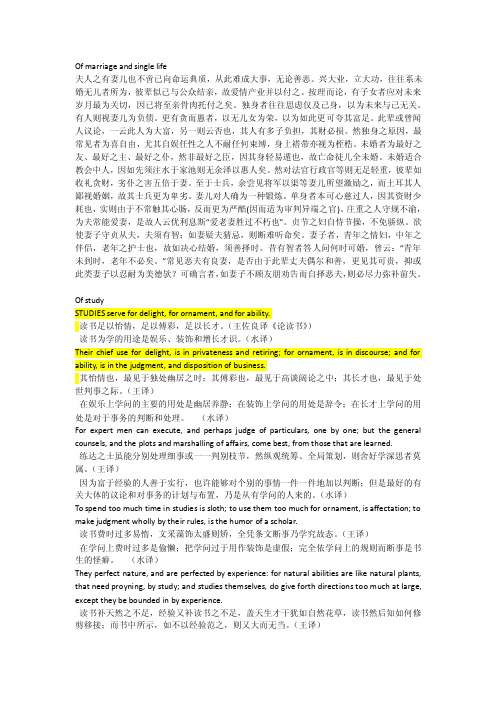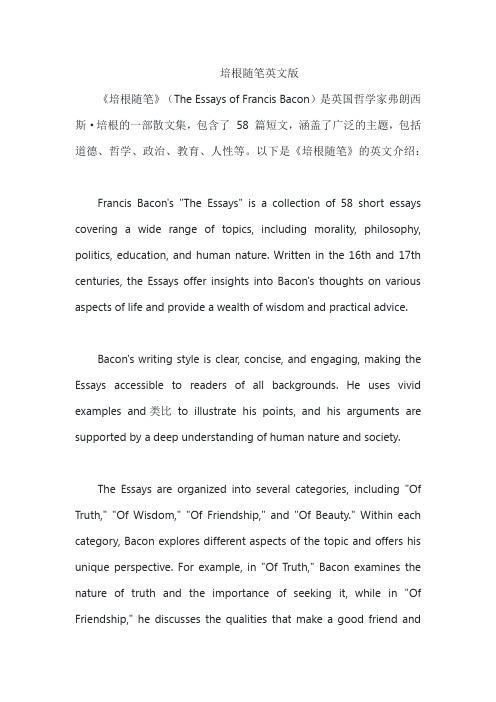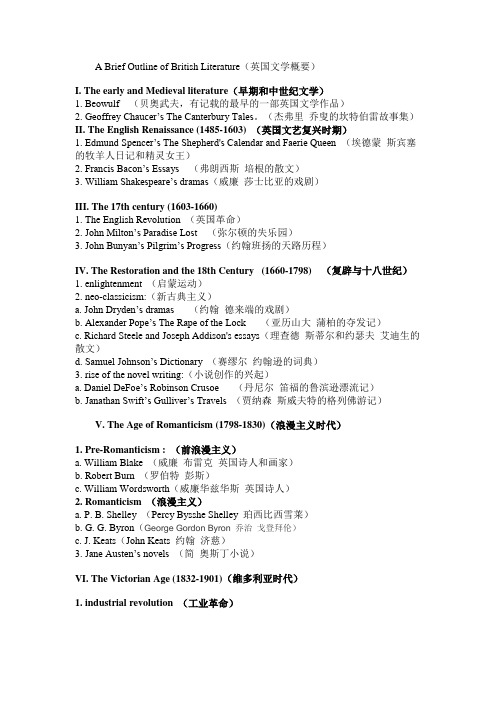Francis Bacon and Essays
FrancisBacon--ofstudy中英文

Of marriage and single life夫人之有妻儿也不啻已向命运典质,从此难成大事,无论善恶。
兴大业,立大功,往往系未婚无儿者所为,彼辈似已与公众结亲,故爱情产业并以付之。
按理而论,有子女者应对未来岁月最为关切,因已将至亲骨肉托付之矣。
独身者往往思虑仅及己身,以为未来与己无关。
有人则视妻儿为负债。
更有贪而愚者,以无儿女为荣,以为如此更可夸其富足。
此辈或曾闻人议论,一云此人为大富,另一则云否也,其人有多子负担,其财必损。
然独身之原因,最常见者为喜自由,尤其自娱任性之人不耐任何束缚,身上褡带亦视为桎梏。
未婚者为最好之友、最好之主、最好之仆,然非最好之臣,因其身轻易遁也,故亡命徒几全未婚。
未婚适合教会中人,因如先须注水于家池则无余泽以惠人矣。
然对法官行政官等则无足轻重,彼辈如收礼贪财,劣仆之害五倍于妻。
至于士兵,余尝见将军以渠等妻儿所望激励之,而土耳其人鄙视婚姻,故其士兵更为卑劣。
妻儿对人确为一种锻炼。
单身者本可心慈过人,因其资财少耗也,实则由于不常触其心肠,反而更为严酷(因而适为审判异端之官)。
庄重之人守规不渝,为夫常能爱妻,是故人云优利息斯“爱老妻胜过不朽也”。
贞节之妇自恃节操,不免骄纵。
欲使妻子守贞从夫,夫须有智;如妻疑夫猜忌,则断难听命矣。
妻子者,青年之情妇,中年之伴侣,老年之护士也,故如决心结婚,须善择时。
昔有智者答人问何时可婚,曾云:“青年未到时,老年不必矣。
”常见恶夫有良妻,是否由于此辈丈夫偶尔和善,更见其可贵,抑或此类妻子以忍耐为美德欤?可确言者,如妻子不顾友朋劝告而自择恶夫,则必尽力弥补前失。
Of studySTUDIES serve for delight, for ornament, and for ability.读书足以怡情,足以傅彩,足以长才。
(王佐良译《论读书》)读书为学的用途是娱乐、装饰和增长才识。
(水译)Their chief use for delight, is in privateness and retiring; for ornament, is in discourse; and for ability, is in the judgment, and disposition of business.其怡情也,最见于独处幽居之时;其傅彩也,最见于高谈阔论之中;其长才也,最见于处世判事之际。
培根随笔英文版

培根随笔英文版《培根随笔》(The Essays of Francis Bacon)是英国哲学家弗朗西斯·培根的一部散文集,包含了58 篇短文,涵盖了广泛的主题,包括道德、哲学、政治、教育、人性等。
以下是《培根随笔》的英文介绍:Francis Bacon's "The Essays" is a collection of 58 short essays covering a wide range of topics, including morality, philosophy, politics, education, and human nature. Written in the 16th and 17th centuries, the Essays offer insights into Bacon's thoughts on various aspects of life and provide a wealth of wisdom and practical advice.Bacon's writing style is clear, concise, and engaging, making the Essays accessible to readers of all backgrounds. He uses vivid examples and类比to illustrate his points, and his arguments are supported by a deep understanding of human nature and society.The Essays are organized into several categories, including "Of Truth," "Of Wisdom," "Of Friendship," and "Of Beauty." Within each category, Bacon explores different aspects of the topic and offers his unique perspective. For example, in "Of Truth," Bacon examines the nature of truth and the importance of seeking it, while in "Of Friendship," he discusses the qualities that make a good friend andthe benefits of friendship.Overall, "The Essays of Francis Bacon" is a timeless work that continues to offer valuable insights and wisdom to readers today. Whether you are interested in philosophy, literature, or simply looking for practical advice on living a good life, the Essays are sure to have something to offer.。
英国文学选读_Francis Bacon弗朗西斯·培根

contenLeabharlann s Bacon’s Life Bacon’s Works Bacon’s Essays(《论说文集》) Quotes from Bacon’s Essays
Bacon’s Life
☻1561 January 22, born in London, the younger son of Sir Nicolas Bacon. ☻1573 April, enters Trinity college, Cambridge where he studies all the sciences then taught. ☻1579 Resides at Gray's Inn. Father's death leaves him penniless so he begins a career in law. ☻1584 Takes a seat in parliament for Dorsetshire. ☻1591 Confidential advisor to the earl of Essex. ☻1593 Takes a seat in parliament for Middlesex. ☻1597 Publishes his Essays《论说文集》along with Colours of Good and Evil and the Meditationes Sacrae.
Francis Bacon 弗朗西斯· 培根
22 January 1561 9 April 1626
18-year old Francis Bacon
An English lawyer, statesman, essayist, historian, philosopher(哲学家), and champion of modern science(现代科学拥护者).
Francis Bacon 培根作品简介

Francis Bacon and His WorksFrancis BaconFrancis Bacon(1561—1626)was one of the leading figures in natural philosophy and in the field of scientific methodology in the period of transition from the Renaissance to the early modern era.He studied at Cambridge (Trinity College) and Gray's Inn, entered Parliament, and gradually established his reputation, but made little progress during Elizabeth's reign.WorksFrancis Bacon left vast and varied writings, which might be divided into three great branches:Scientifical works — in which his ideas for an universal reform of knowledge, scientific method and the improvement of mankind's state are presented.Religious/literary works — in which he presents his moral philosophy and theological meditations. Juridical works — in which his reforms in Law are proposed.ContributionsFrancis Bacon had made great contributions on Literature, Philosophy, Science, law and art. Literature:Francis Bacon’s literatur al work mostly are proses and essays. There are some features of Bacon's essays: ①the language is very neat, pretty and weighty. ②the sentences are very short. Bacon also likes to use more co-ordinate conjunctions than the subordinated ones, such as "as, since, because". ③the devices are parallelism, epigrams(警句), metaphor,and simile.And his most important work is Essay, which was regarded as one of the greatest prose works in the world for its brevity, compactness and powerfulness. Essay covers a wide variety of subjects, such as love, truth, friendship, politics, economy, religion, beauty, studies, and marriage.Of TruthⅠ Brief Introduction●First published in 1625●Francis Bacon declares that truth in the philosophical and theological sense, as well as honesty in thecivil business sense, are the "sovereign good of human nature."Ⅱ Background Information“What is truth?” said jesting Pilate (Full name: Pontius Pilate)●According to the new testament scripture, at first, Pilate thinks Jesus is innocent, for he had questionedJesus for many times. But under the pressure of the jewish religious leaders, Jesus was sentenced to death.●In the conversation between Pilate and Jesus, Pilate asked,''what have you done?'' Then, Pilateasked:“What is truth?”●Actually Pilate knew Jesus was innocent but he still asked , “What is truth” . At that time a lot of peoplelike Pilate, they do know what is truth but they pretend they don’t know .●Bacon uses this Bible story to introduce his topic——truth. He wants to tell people what is truth andwhat attitude should we take towards truth.Ⅲ TopicThe inquiry of truth, which is the love-making or wooing of it, the knowledge of truth, which is the presence of it, and the belief of truth, which is the enjoying of it, is the sovereign good of human nature.Ⅳ Sentences Analysis1. “But it is not only the difficulty and labor, which men take in finding out of truth, nor again, that when it is found, it imposeth upon men's thoughts, that doth bring lies in favor; but a natural though corrupt love, of the lie itself.”●Up to this point Bacon is saying there are few philosophical skeptics left but humans still prefer thefreedom to choose their own views over the hard work of pursuing truth especially since they consider truth constricting.2. No advantageBacon writes “One of the later school of the Grecians, examineth the matter, and is at a stand, to think what should be in it, that men should love lies; where neither they make for pleasure, as with poets, nor for advantage, as with the merchant; but for the lie's sake.”3. AdvantagesBacon writes “A mixture of a lie doth ever add pleasure. Doth any man doubt, that if there were taken out of men's minds, vain opinions, flattering hopes, false valuations, imaginations as one would, and the like”4. DisadvantagesBacon writes “but it would leave the minds, of a number of men, poor shrunken things, full of melancholy and indisposition, and unpleasing to themselves?”5. “truth, which only doth judge itself, teacheth that the inquiry of truth, which is the love-making, or wooing of it,”●“yet truth, which only doth judge itself” means that “that truth seeking faculty is the sole judge of truth.”●In “the love-making, or wooing of it” Bacon means the happy match between the mind of man and thenature of things.”6. “The first creature of God, in the works of the days, was the light of the sense; the last, was the light of reason.”●Bacon believed that God gave us our senses to determine truth be he also believed God gave us theability to reason to determine truth.Ⅴ Beautiful Sentences1.But I cannot tell; this same truth, is a naked, and open day-light, that doth not show the masks, and mummeries, and triumphs, of the world, half so stately and daintily as candle-lights.余亦难言究竟,唯思真理犹如白日无遮之光,直照人世之歌舞庆典,不如烛光掩映,反能显其堂皇之美。
英语专业,英国文学,考研,期末考试必备 培根 Francis Bacon

His Works
The Advancement of Learning (1605) (in English) 《学术的进展》 Novum Organum (1620) ( an enlarged Latin version of The Advancement of Learning) 《新工具论》
So he entered Gray’s Inn to study law.
23: became M.P. for his eloquence and gradually established his reputation; found Earl Essex as his patron,who is Elisabeth’s favorite courtier. Later: offended the Queen by strongly opposing to some new taxes;managed to make the court sentence death to Essex by the crime of treason. 45: defended for the King’s taxes(James I) became Lord Keeper and then Lord Chancellor of England. 60: was accused of taking bribes in office,deprived of his seat in parliament , and fined ; after token imprisonments, Bacon retired in disgrace to spend the last five years of his life in the study of science and philosophy.
Francis Bacon-英国文学史及选读

23: became M.P. for his eloquence and gradually established his reputation; found Earl Essex as his patron,who is Elisabeth’s favorite courtier. Later: offended the Queen by strongly opposing to some new taxes;managed to make the court sentence death to Essex by the crime of treason. 45: defended for the King’s taxes(James I) became Lord Keeper and then Lord Chancellor of England. 60: was accused of taking bribes in office,deprived of his seat in parliament , and fined ; after token imprisonments, Bacon retired in disgrace to spend the last five years of his life in the study of science and philosophy.
• professional works
• • Maxims of Law 《法律原理》 The Learned Reading upon the Statute of Uses (1642)《法令使用读本》
Essay: A Definition
• It is a relatively short literary composition in prose, in which a writer discusses a topic, usually restricted in scope, or tries to persuade the reader to accept a particular point of view. • the term essai was first applied to the form in 1580 by Montaigne, one of the greatest essayists of all time, to his pieces on friendship, love, death, and morality. In England the term was inaugurated in 1597 by Francis Bacon, who wrote shrewd meditations on civil and moral wisdom.
of studies中英赏析

of studies中英赏析《论研究》是英国文学家培根(Francis Bacon)的一篇经典散文,它以对学习和研究的思考为主题,阐述了研究的重要性和方法。
本文旨在通过对《论研究》的中英赏析,探讨其思想内涵和艺术特点。
《论研究》一文由五个部分组成,分别是“阅读使人完善”、“交谈使人机智”、“写作使人严谨”、“思考使人深刻”和“各种学习方法的效果比较”。
整篇文章以简明扼要的语言,阐述了学习和研究的不同方式对于提高个人能力的重要作用。
文章提到阅读的重要性。
培根认为,阅读使人完善,开拓了人的眼界,丰富了知识储备。
他强调了对于书籍的选择要有所取舍,要选择经典著作和有深度的内容进行阅读。
通过阅读,人们可以获取到前人的智慧和经验,提高自己的见识和理解能力。
文章讲述了交谈的价值。
培根认为,交谈可以使人变得机智。
在与他人的交流中,人们不仅可以学到新的知识,还可以通过与他人的观点碰撞,提高自己的思维能力和逻辑思维能力。
同时,交谈也是一种锻炼表达能力和沟通能力的方式。
接着,文章提到了写作的重要性。
培根认为,写作使人变得严谨。
通过写作,人们可以把自己的想法和观点清晰地表达出来,从而更好地理清思路,提高自己的逻辑思维能力和表达能力。
同时,写作也是一种对于自己思考的检验,可以帮助人们发现自己的不足和问题,进一步提高自己的学术能力。
然后,文章讲述了思考的重要性。
培根认为,思考使人变得深刻。
通过对问题的思考,人们可以深入理解问题的本质和内涵,从而提高自己的分析和解决问题的能力。
培根强调了思考的方法和技巧,比如要善于提出问题、善于质疑和思考多个角度等。
文章对比了各种学习方法的效果。
培根认为,阅读是最基本的学习方法,通过阅读可以获取到大量的知识。
但是,阅读单一的知识来源可能会导致思维的狭窄,因此,培根提倡多种学习方法的结合使用,如阅读、交谈、写作和思考的有机结合。
总结来说,《论研究》是一篇关于学习和研究的经典散文,强调了阅读、交谈、写作和思考对于提高个人能力的重要作用。
英国文学史大纲

A Brief Outline of British Literature(英国文学概要)I. The early and Medieval literature(早期和中世纪文学)1. Beowulf (贝奥武夫,有记载的最早的一部英国文学作品)2. Geoffrey Chaucer’s The Canterbury Tales。
(杰弗里乔叟的坎特伯雷故事集)II. The English Renaissance (1485-1603) (英国文艺复兴时期)1. Edmund Spence r’s The Shepherd's Calendar and Faerie Queen(埃德蒙斯宾塞的牧羊人日记和精灵女王)2. Francis Bacon’s Essays(弗朗西斯培根的散文)3. William Shakespeare’s dramas(威廉莎士比亚的戏剧)III. The 17th century (1603-1660)1. The English Revolution (英国革命)2. John Milton’s Paradise Lost(弥尔顿的失乐园)3. John Bunyan’s Pilgrim’s Progress(约翰班扬的天路历程)IV. The Restoration and the 18th Century (1660-1798) (复辟与十八世纪)1. enlightenment (启蒙运动)2. neo-classicism:(新古典主义)a. John Dryden’s dramas(约翰德来端的戏剧)b. Ale xander Pope’s The Rape of the Lock (亚历山大蒲柏的夺发记)c. Richard Steele and Joseph Addison's essays(理查德斯蒂尔和约瑟夫艾迪生的散文)d. Samuel Johnson’s Dictionary(赛缪尔约翰逊的词典)3. rise of the novel writing:(小说创作的兴起)a. Daniel DeFoe’s Robinson Crusoe(丹尼尔笛福的鲁滨逊漂流记)b. Janathan Swift’s Gulliver’s Travels(贾纳森斯威夫特的格列佛游记)V. The Age of Romanticism (1798-1830)(浪漫主义时代)1. Pre-Romanticism : (前浪漫主义)a. William Blake (威廉布雷克英国诗人和画家)b. Robert Burn (罗伯特彭斯)c. William Wordsworth(威廉华兹华斯英国诗人)2. Romanticism (浪漫主义)a. P. B. Shelley (Percy Bysshe Shelley 珀西比西雪莱)b. G. G. Byron(George Gordon Byron 乔治戈登拜伦)c. J. Keats(John Keats 约翰济慈)3. Jane Austen’s novels(简奥斯丁小说)VI. The Victorian Age (1832-1901)(维多利亚时代)1. industrial revolution (工业革命)2. realism (现实主义)a. Charles Dickens (查尔斯狄更斯英国作家)b. Thomas Hardy(托马斯哈代英国小说家)c. Bronte sisters(勃朗特三姐妹)d. George Eliot(乔治艾略特)3. aestheticism: Oscar Wilde (唯美主义,奥斯卡王尔德)VII. The 20th century (1901-)1. two world wars(两次世界大战)2. modernism(现代主义)3. psychological fiction and stream of consciousness (心理小说与意识流)a. D. H. Lawrence (David Herbert Lawrence大卫赫伯特劳伦斯)b. James Joyce(詹姆斯乔伊斯)c. Virginia Woolf(弗吉尼亚伍尔夫)4. Poetry(诗歌)Definition of Literature :Literature refers to All written or spoken compositions ( discourses) designed to tell stories, dramatize situations and reveal thoughts and emotions, and also more importantly, to interest, entertain, stimulate, broaden and ennoble readers. (文学的定义:文学是所有口头或书面的成分设计讲故事,戏剧化情况,揭示思想和情感,而且更重要的是,兴趣,娱乐,刺激,拓宽和授予爵位的读者。
- 1、下载文档前请自行甄别文档内容的完整性,平台不提供额外的编辑、内容补充、找答案等附加服务。
- 2、"仅部分预览"的文档,不可在线预览部分如存在完整性等问题,可反馈申请退款(可完整预览的文档不适用该条件!)。
- 3、如文档侵犯您的权益,请联系客服反馈,我们会尽快为您处理(人工客服工作时间:9:00-18:30)。
Francis Bacon and the Essays“K nowledge is power.”, said by Francis Bacon, is a well-known saying all over the world which encourages a large amount of people to pursue intelligence. As “a man of Renaissance”,Bacon showed his greatness in many different kinds of fields and left the precious spiritual wealth for posterity.The whole life of Francis Bacon was a process of the search for knowledge and also the search for power. He was born in a noble family in 1561 whose father was Sir Nicholas Bacon, Lord Keeper of the Seal, and mother was Ann Cook, sister-in-law of Lord Burleigh, greatest of the queen’s statesmen. With this kind of family background and social relationship, Bacon could receive good education from childhood. At twelve he went to Trinity College, Cambridge to study theology,metaphysics,logic,mathematics,astronomy, Greek and Latin. After graduating he tried to seek political success in career. Bacon went to Paris with British Ambassador where he served as the Foreign Affairs Secretary for the British Embassy in France and learned statistics and diplomacy. Later in 1579, as the death of his father, Bacon went back in England and began to work for the British royal family and government. The occasion helped his political career to be on track was the succession of James I. Bacon’s advocacy of merging Scotland and England strongly praised by the king. From then on, he rose directly to a high position: he was appointed as the king’s adviser in 1604, the Attorney General in 1613, the Consultant of Privy Council in 1616, the Lord Keeper of the Seal in 1617, and finally Lord High Chancellor in 1618, the head of the legal system of England.Besides an outstanding statesman, Bacon is also “the real primogenitor of English materialism and the whole modern experiential science”praised by Marx. Bacon represented the thoughts of the new aristocracy and was against the divine right of kings by advocating the reform and limitation to the royal power, and also supporting the Puritanism. On the contrary, he completely opposed revolution and medieval scholasticism. Inheriting the ancient materialism tradition, he acknowledged nature is material. Bacon was the first to realize the historical significance of science and its methodology. He tried to analyze and determine the general scientific method and demonstrate its application mode, giving new scientific movement power and direction of development. Bacon put forward the basic principle of materialistic empiricism and said that feeling is the beginning of knowledge. The importance of experiment is fully recognized by him who believed it was necessary to use experiment, in order to make up for the lack of sensory and deeply revealed the secret of nature. His materialism philosophy has a great influence on the evolution of the modern philosophy and his principal and best known of the philosophical works are:the Advancement of Learning,published in English in 1605;the Novum Organum,published in Latin in1620;and the De Augmentis,published in Latin in 1623.In 1621, there was a major turning point in Bacon's life. He was accused of corruption by Congress and sentenced to a fine of forty thousand pounds and imprisoned in the tower of London. Although the fine and imprisonment were exempted at last, Bacon lost all standing and reputation because of the accident. Since then he turned all attentions from politics to theoretical writings. His works are characterized by the beautiful writing, refining language, and profound meaning, especially as for his masterpiece the Essays.The Essays is the first writing English essay and plays an important role in the history of world literature. It has been translated into many languages as the enduring best seller. It was also named as "one of the 20 best books in human history”by American magazine Life in 1985. The book depicts a wide range of things in the world, showing the vicissitudes of life. It is said that many people are edified by the book's influence. As for today’s young readers, the Essays i s like a wise old man speaking with fervor and assurance, because it contains the essence of the sage. The main content of the book is some short comments telling Bacon’s attitudes and ideas of different perspective of things. It involves politics, economy, religion, love, marriage, friendship, art, education, ethics and many other aspects. From Of Truth, Of Death, and Of Nature in Men, we can see he is a lover of philosophy;from Of Empire, Of Ambition, and Of Boldness,we can see he is a sophisticate of officialdom;from Of Love, Of Friendship, and Of Marriage and Single Life, we can see he is a man of taste; from Of Adversity, Of Happiness, and Of Deformity, we can see he is a powerhouse of self-improvement; from Of Discourse, and Of Simulation and Dissimulation, we can see he is a wit of worldliness. Having such a positive and fulfilling political career, Bacon seems no time to do any other things. But his immortal fame and well reputation will be in place by his philosophical and literary works, rather than his political activities. The Essays is concise and comprehensive, wise and attractive. It contains many of the wise remarks of an experienced person, which not only refers to the politics but also explores many life philosophies.In the Essays, there are many famous sayings such as “Histories make men wise; poets witty; the mathematics subtitle; natural philosophy deep; moral grave; logic and rhetoric able to contend.”and”Travel, in the younger sort, is a part of education; in the elder, a part of experience. ”Both of them and many other remarks in the book could reveal one aspect of the philosophy of life which can enlighten different groups of people in the society. Nevertheless, in my opinion young people are the largest beneficiaries, because their outlook on life, value and world is still in the formation stage and they need the correct direction to lead them. Nearly every significant entry point has been mentioned in the book which reminds and encourages us when we go through ups and downs in the life. We all need a lamp to illuminate the road and the Essays is just the lamp. It shows the great wisdom of the writer after experiencing so many hardships of life, and meanwhile it also shows the great wisdom of the world which is never plain sailing.People can say Francis Bacon is a true modern philosopher. The whole set of his world outlook is secular rather than religious. He is a rationalist rather than asuperstitious admirer, an empiricist rather than a sophist, a realist rather than a theorist. His profound knowledge, wonderful language together with science and technology resonate in a perfect way.Although Bacon is a loyal Englishman, his vision far exceeded his own borders. His scientific conjecture is intended as a starting point for the further discussion but not as the final conclusion. He is a sign of the times.The depth and breadth of his life is the eternal pursuit of us today.。
